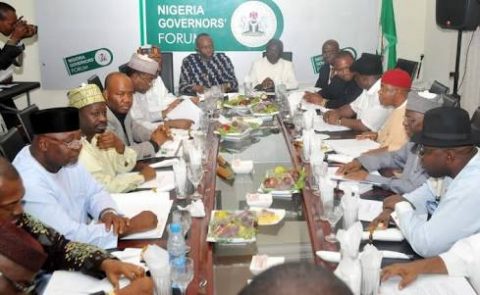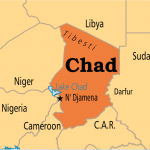Opinion: Governors’ Reckless Borrowing Must Stop
Articles/Opinion, Featured, Latest Headlines Monday, June 27th, 2016
By Oyewale Oyelola
BALTIMORE, MD (AFRICAN EXAMINER) – The National Economic Council (NEC) headed by Vice President, Professor Yemi Osinbajo in June announced decision of the Federal Government (FG) to facilitate N90billion loan for States to cushion the effects of economic hardship in the country. From the onset, Osinbajo cautioned that the loan would be accessible only by States who meet 23 conditions set for the third phase of bailout by President Muhammadu Buhari’s administration.
The latest is the third bail-out package for states since inception of APC led-FG. It would be recalled the Central of Bank Nigeria (CBN) in September 2015 released N338billion bailout Fund to 27 states, while FG negotiated on their behalf, loan restructuring with banks in February 2016 so as to have enough fund to meet other financial obligations.
Conditions for the bail-out to be accessed according to the Federal Ministry of Finance and CBN include: Publish audited annual financial statements within 9 months of financial year end; Comply with the International Public Sector Accounting Standards (IPSAS); Publish state budget online annually; Publish budget implementation performance report online quarterly; Implement a centralized Treasury Single Account (TSA) in each state and quarterly financial reconciliation meetings with Federal Government to cover VAT, PAYE remittances, refunds on government projects, Paris Club and other accounts. The objective is to improve VAT and PAYE collection.
Also biometric capture of all states’ civil servants will be carried out to eliminate payroll fraud; introduce a system of continuous audit (internal audit), establish a capital development fund to ring- fence capital receipts and adopt accounting policies to ensure that capital receipts are strictly applied to capital projects; Domesticate Fiscal Responsibility Act (FRA). Attainment and maintenance of a credit rating by each State of the Federation; comply with the FRA and reporting obligations, including: No commercial bank loans to be undertaken by States; Routine submission of updated debt profile report to the DMO among other measures for financial transparency.
Governor Udom Emmanuel of Akwa Ibom has dropped the hint that five states have completed the processes to access the N90 billion credit. The loan he explained is to be disbursed in two tranches – with an initial N50 billion released in three months and another N40 billion in nine months, and will be shared among qualified States at a 9 per cent interest rate.
Udom said: “What we are looking at is what are the solutions? We must provide a lifeline for people to survive and to move on. I don’t think it’s too much”.
Regardless of this, many Governors still consider the loans as a means of personal enrichment. Recently the Independent Corrupt Practices and Other Related Offences Commission (ICPC) accused Imo, Zamfara and Bauchi States of diverting the bailout funds released to them by the Central Bank of Nigeria.
Imo State collected the sum of N26billion plus from the CBN; paid the amount into two commercial banks and transferred part of the money into uses not related to workers’ salaries. Apparently on account of this, the EFCC in March arrested three top officials of the South East State for allegedly diverting N2billion bailout fund.
Zamfara State, which applied for N32.5bn but as at the time of collecting N10 billion from the FG for workers’ arrears, the state was reportedly not indebted to any of its workers. Zamfara made overtures to its House of Assembly so as to approve the use of the money for the settlement of indebtedness to contractors and other purposes.
Adamawa State got N9.5billion but paid workers N2.3billion, while Benue State received N12billion and disbursed N10.8billion with a balance of N1.6billion. Analysis of the documents revealed a double payment of N37.7million in favour of Office of the Deputy Governor. Bauchi State Governor allegedly use his State’s bailoutmoney to buy cars.
Kwara State Governor, Abdulfatai Ahmed disclosed that his state will source for N20billion bond at capital market. The State Internally Generated Revenue (IGR) has increased to over to N2billion; her monthly allocation from FAAC is about N2billion and the state government has pledged to work round the clock to meet conditions for new bailout package. With this, the fundamental question that comes to mind is why Kwara State is borrowing at every giving opportunity?
Governor Nyesom Wike of Rivers State from May 2015 till date has borrowed over N40billion will little projects to show for it. APC has alleged that Wike spent N10billion to host controversial PDP National Convention.
The Kano State Governor, Dr. Umar Ganduje is battling with debt left by his immediate past predecessor, Rabiu Musa Kwankwaso. Investigations revealed many ongoing projects have been abandoned due to lack of funds.
Findings have also shown that some Governors initiate frivolous projects to get loan. For instance, what is the economic justification of ongoing Airport project in Osun and Ekiti states? Some analysts have drawn conclusion that 50 percent of loan deal goes to private purse of governors and their associates.
The ugly trend must stop in order to save future generations of this country. If the reckless borrowing continues, then, the country might be toying with insolvency – a clear sign of a collapsed economy.
As one of the ways out, our Banks should be managed in such a manner that they are transparent and sensitive while granting state loans. Similarly, the Stock Exchange must be careful in dealing with state bonds.
In addition, the State House of Assembly members should wake-up to perform their oversight responsibilities by monitoring financial activities of the executives. They should not just be rubber stamp of their Governors.
The States’ Chief Executives (Governors) must be creative and responsible in managing affairs of their state. They must be conscious of the enormity of the tasks on them.
Government agencies such as EFCC, ICPC, FRA and others must continue to keep track on the Governors, so as to make them accountable. Corrupt Governors must be punished in accordance to the law.
On his part, President Buhari must do all he can to encourage transparency among the Governors so as to ensure accountability; financial discipline and viable macro economy on a long term.
Related Posts
Short URL: https://www.africanexaminer.com/?p=33834





















